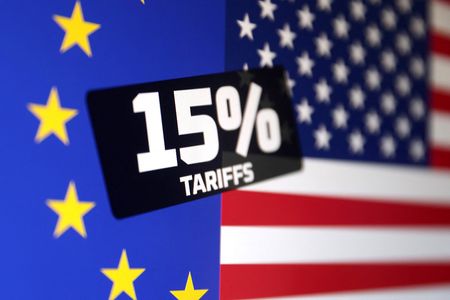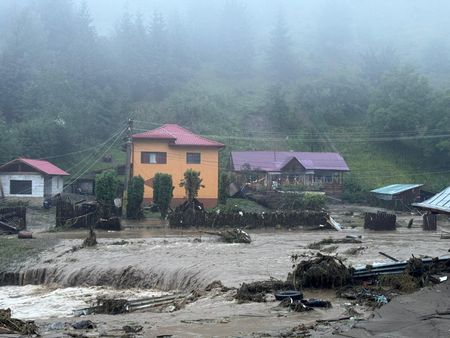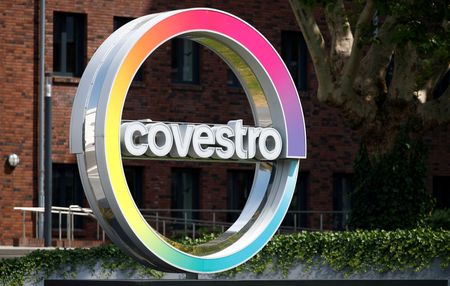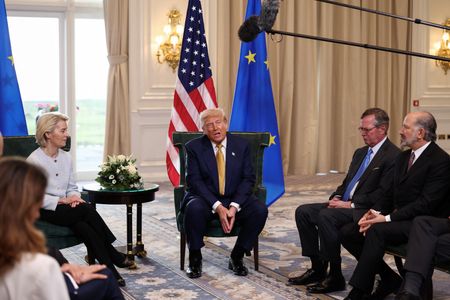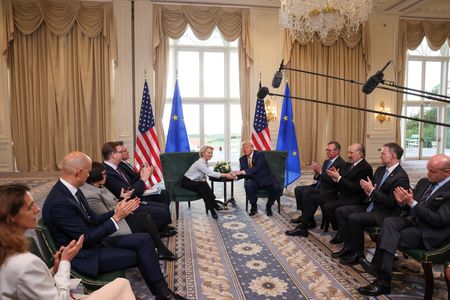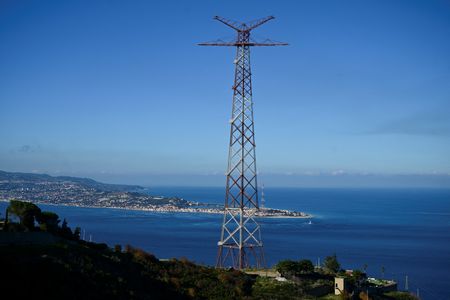By Adam Jourdan
LONDON (Reuters) -European companies were on edge on Monday as corporate leaders tried to unpick the real impact of a hard-won U.S. trade deal and lamented a sharp jump in tariffs versus those in place before President Donald Trump’s second term.
The trade deal announced on Sunday imposes a 15% import tariff on most EU goods. After an initial rally on relief that some sort of deal had been reached, shares of carmakers and alcohol firms fell.
Leading the way lower were BMW, Volkswagen, Mercedes-Benz and Stellantis, along with Pernod Ricard and Anheuser-Busch InBev, all down between 1-2%.
The falls reflect how the deal is being seen as lopsided, more a win for U.S. President Donald Trump, as well as ongoing uncertainties about the fine print of the final agreement.
The 15% rate is better than the 30% once threatened by Trump and will bring clarity for European makers of cars, planes and chemicals, but it’s well above initial hopes of a zero-for-zero agreement and an average rate last year of around 2.5%.
“The price is high for both sides. European exports are losing competitiveness. U.S. customers are paying the tariffs,” said Wolfgang Große Entrup, head of the German Chemical Industry Association VCI, adding though that it could have been worse.
“Those who expect a hurricane are grateful for a storm.”
The deal, which also includes $600 billion of EU investments in the United States and $750 billion of EU purchases of U.S. energy over Trump’s second term, includes some exemptions, even if details are still to be ironed out.
For carmakers, the 15% tariff is down from more than 25% under the global levy imposed by Trump in April. The EU is also cutting its tariff on U.S.-made cars to 2.5%, a senior European Commission official involved in the talks said.
Car parts makers were amongst the strongest stock market performers. Valeo was up around 4% while French supplier Forvia, which also announced robust results earlier on Monday, was up over 10%.
“Tariffs are lower than those imposed by the U.S. administration in recent months, and if it reduces volatility and uncertainty, it’s better for all economic players,” Forvia’s CFO Olivier Durand said on an earnings call.
Aircraft and aircraft parts will be exempt – good news for French planemaker Airbus – as will certain chemicals, some generic drugs, semiconductor equipment, some farm products, natural resources and critical raw materials.
Shares in pharmaceutical companies Sanofi, Roche and Novo Nordisk all edged up, while generics maker Sandoz rose strongly.
“It’s definitely better than 200%. Most had 25% factored. But I don’t think anyone believes it until it’s signed,” an industry source told Reuters, referring to previous threats from Trump to tax pharmaceutical imports.
Shares in the world’s biggest supplier of computer chip-making equipment ASML also rose more than 4%, among the biggest gainers on the pan-European STOXX 600 index.
STILL TO BE NEGOTIATED
Dutch brewer Heineken cheered the deal, with CEO Dolf van den Brink welcoming the certainty it brought.
The world’s No.2 brewer sends beer, especially its namesake lager, to the U.S. from Europe and Mexico, and has also suffered from the indirect effect on consumer confidence in important markets like Brazil.
The rate on spirits that could impact firms such as Diageo, Pernod Ricard and LVMH is still being negotiated though.
“It seems that in coming days there could be negotiations for certain agricultural products, zero for zero, which is what the European and U.S. sectors have been calling for,” said Jose Luis Benitez, director of the Spanish Wine Federation.
Benitez added that a 15% rate could put Europe at a disadvantage versus other wine exporting regions subject to 10% tariffs.
“If there are any exceptions, we hope that the (European) Commission understands that wine should be one of them.”
Lamberto Frescobaldi, the president of Italian wine body UIV, said on Sunday that 15% tariffs on wine would result in a loss of 317 million euros ($372.63 million) over the next 12 months, though the group was waiting to see the final deal text.
Others said that the agreement- which followed on the heels of a similar one with Japan – helped bring greater clarity for company leaders, but could still hurt European firms.
“While this agreement puts an end to uncertainty, it poses a significant threat to the competitiveness of the French cosmetics industry,” said Emmanuel Guichard, secretary general of French cosmetics association FEBEA, which counts L’Oreal, LVMH and Clarins among its members.
($1 = 0.8507 euros)
(Reporting by Sabine Wollrab, Dominique Patton, Corina Rodriguez, Giselda Vagnoni and Maggie Fick; Writing by Adam Jourdan; Editing by Kirsten Donovan)

